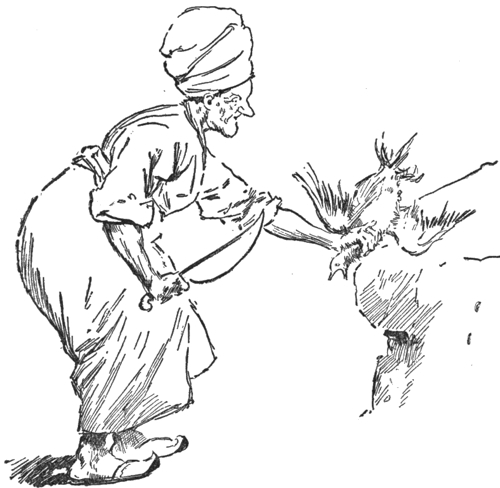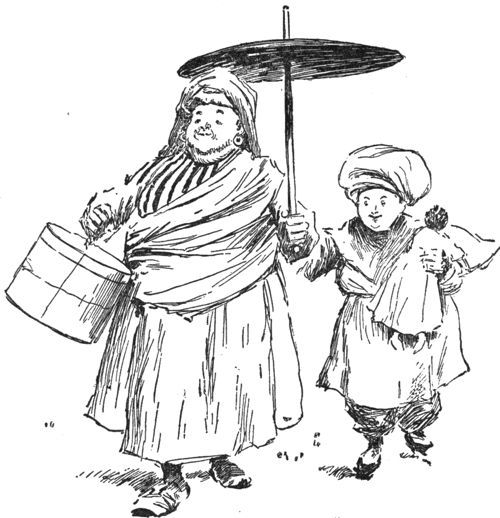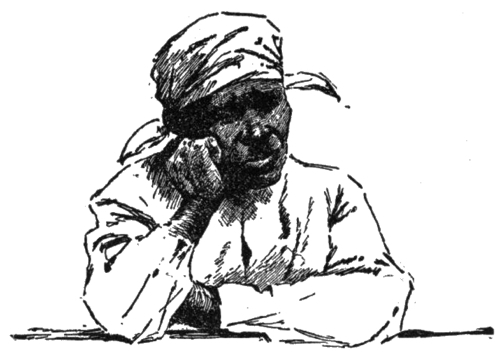CHAPTER XIV.
THAT very night I went into Genieve’s room to kiss Snow and Boy good-night.
But both the darlin’s wuz fast asleep, Snow in her little white bed and Boy in his crib. Their faces looked like fresh roses aginst their white pillers, and I did kiss ’em both, but light, so as not to wake ’em up.
Sweet little creeters, I think my eyes on ’em.
Genieve, I see, when I went in wuz a readin’ some book, and as I looked closter at it I see it wuz the Bible. I see she wuz a readin’ about her favorite topick, the old prophets and their doin’s and their sayin’s.
And as I sot down a few minutes by the side of my sweet darlin’s she begun to talk to me about Daniel, and St. John, and some of the rest of them good, faithful old prophets.
Why, she wuz brung up with ’em, as you may say.
She had sot under them old prophets ever sence she had sot at all.
And why shouldn’t she went on about ’em and love ’em when she had fairly drinked in their weird, fascinatin’ influence with her mother’s milk?
She wuz a readin’ about Daniel jest as I went in—about how Daniel stood by the deep waters and heard a voice sayin’ to him:
“Understand.”
And sez she, with her great, beautiful eyes all aglow, “Don’t you think that we who stand by deep waters to-day can hear the voice if we listen?”
“Yes,” sez I, “I believe it from the bottom of my heart; if we do as Daniel did, ‘set our hearts to understand,’ we can be kep’ from perils as he wuz, and we can hear that Divine Voice a biddin’ us to understand and to be strong.”
Sez I, “I believe that Voice almost always comes to us in the supreme moments of our greatest need. When we have been mournin’ as Daniel had, and ‘eaten no pleasant bread,’ and lay with our faces on the ground by the deep waters, then comes One to us, onseen by them about us, and touches our bowed heads and sez:
“‘Beloved, fear not. Peace be unto thee. Be strong. Yea, be strong.’”
And then we went on and talked considerable, and she told me how her mother had read to her, as soon as she wuz able to understand anything, all about the prophets, and how she had always loved to think about ’em and their divine work.
And I told her I felt jest so; I thought they wuz likely old creeters, them and their wives too.
And Genieve looked up dretful startled and surprised, and said she had never thought about their wives, not at all.
And I sez, “Like enough, nobody duz. Nobody ever did think anything about old Miss Daniel, or Miss Zekiel, or any of ’em. Nobody ever thought of givin’ the wimmen any credit, but they deserve it,” sez I. “I believe they wuz likely old females, every one of ’em.”
Genieve still looked dretful wonderin’, and as if I had put a bran new idee into her head. As much as she had pondered and studied them prophets, she never had gin a thought to them good old females—faithful, hard-workin’ creeters, I believe they wuz.
And she sez, sez she, “I never thought anything about them, whether they had any troubles or not.”
“No,” sez I, “I spoze not, but I believe they had ’em, and I believe they had a tuckerin’ time on’t more’n half the time.
“Why,” sez I, “it stands to reason they had. While their husbands wuz a sallyin’ out a prophesyin’, somebody had to stay to home and work, split kindlin’ wood, etc.”
Genieve looked kinder shocked, and I sez warmly:
“Not but what I think a sight of them old prophets, sights of ’em. My soul burns within me, or almost burns, a thinkin’ of them old men of whom the world wuz not worthy, who had to tell the secret things that the Lord had revealed to ’em to the ears of a blasphemin’ and gainsayin’ world. I jest about worship ’em when I think of their trials, their persecutions, their death for duty’s sake.
“But while I honor them old men up to the very highest pint honor can go in a human breast, still I have feelin’s for their wives—I can’t help feelin’ sorry for them poor old creeters.
“Not a word do we hear about them, and it makes me feel bad to see my sect so overlooked and brought down to nort.
“And I’ll bet (or would bet if it wuzn’t for principle) that old Miss Daniel, and Miss Zekiel, and Miss Hosey, and Miss Maleky, and all the rest of them old female wimmen had a tough time on’t.
“Why, if there wuzn’t anything else to trouble ’em, it wuz enough to kill any woman to see the torment and persecutions that follered on after the man she loved. To see ’em wanderin’ about in sheepskin and goatskin, and bein’ afflicted, and destitute, and tormented.
“That wuz enough to break down any woman’s happiness; but they had to buckle to and work head work most likely to take care of themselves and their children.
“‘Destitute’ means privation and starvation for old Miss Prophet and the children, as well as for the husband and father.
“And I’ll bet that old Miss Hosey and Miss Maleky jest put to it and worked and made perfect slaves of themselves.
“And with all this work, and care, and privation on their minds and hearts, they couldn’t have got such a dretful sight of sympathy and companionship out of their husbands, to say nuthin’ of help and out-door chores.
“For though the old prophets wuz jest as likely as likely could be and did what wuz perfectly necessary and right, still while they wuz out in the streets a hollerin’ ‘Woe! woe! to this wicked city!’ etc., etc., they couldn’t at the same time be to home a talkin’ affectionate to their pardners or a sawin’ wood. I’ll bet old Miss Maleky picked up more than half she burned, and split pretty nigh all her own kindlin’ wood, and killed her hens, and sot ’em, etc., etc.

“AND KILLED HER HENS.”
“Them days seem a good ways off to us, and things seen through the misty, hazy atmosphere of so many years seem sort o’ easy to us.
“But I don’t spoze water would bile then without a fire no more than it would now. And I spoze the dishes, or whatever they kep’ their vittles in then, had to be washed.
“And I spoze the goatskins and sheepskins that them good old men wandered round in had to be cleaned every now and then—it stands to reason they did. And I don’t believe them prophets did it; no, I don’t believe they had the time to, even if they thought on’t.
“No; I dare presume to say that every time you found a prophet you would find some woman a takin’ care on him, so he could have the freedom of mind and the absence of domestic cares necessary to keep his soul the calm medium through which divine truth could pour down upon a sinful world.
“The sieve must be held right end up or you can’t sift through it; hold it sideways or bottom end up, and where be you?
“No; old Miss Hosey and Miss Maleky, I dare presume to say, jest wrastled round with household cares and left them old men as free as they could.
“I’ll bet the minds of them good old prophets wuzn’t opset with pickin’ geese and ketchin’ gobblers, or makin’ hens set, or fastenin’ down the tent stakes if the wind come up sudden in the night.
“No; I’ll bet Miss Hosey, that good old creeter, got up herself and hung onto them flappin’ ends and drove down the stakes herself, so’s Mr. Hosey could get a little sleep. Or if little Isaac, or Lemuel, or Rebeckah Hosey wuz took sudden with the croup or infantum, I’ll bet it wuzn’t old Mr. Hosey that got up and hunted round for the goose oil, or groped his way round and started up a fire, and steeped catnip, and heat cloths, and applied ’em.
“No; it wuz that good old female creeter every time, I wouldn’t be afraid to say it wuz.
“And ten to one if her pardner didn’t wake up and ask her ‘what she wuz makin’ such a noise for in the middle of the night, and tell her she wuz jest spilin’ them children a indulgin’ ’em so, and if she had kep’ their sandals on, they wouldn’t have took cold,’ etc., etc., etc.
“And then if she got into bed agin with cold feet he complained bitterly of that.
“And so, I dare presume to say Miss Hosey or Miss Maleky, as the case might be, sot up with them children, pulled one way by her devoted affection for ’em, and the other way by her wifely love, and tried to keep ’em as still as she could, and shet up them babies if they went to cry, for her husband’s sake, and tried to doctor ’em up for their own sake, and felt meachin’ through it all, borne down by the weight of her husband’s onmerited blame and fault-findin’.
“And the next mornin’, I dare presume to say, she went round with a headache, and got as good a breakfast as she could with what she had to do with; and if her husband waked up feelin’ kind o’ chirk and said a kind word to her, or kissed her, I dare say she forgot all her troubles and thought she had the best husband in the world, and she wouldn’t change places with anybody on earth.
“For female human nater is about the same from Eve down to she that wuz Samantha Smith.
“And then I dare presume to say that as bad as she felt, and as much as she needed a nap, she jest helped him off on his prophesying trip, did everything she could for his comfort before he went, brushed his goatskin, and mebby cleaned it, and took care of the children till he come back, fed the camels, and watered the goats, and I dare presume to say got kicked by ’em, as bad as she felt.
“Made her butter—like as not she had a big churnin’—or a baggin’ I don’t know but it ort to be called—I spoze they used a bag instead of a churn.
“And then mebby she had lots of little young goats and camels to bring up by hand. I shouldn’t wonder if she had a camel corset that took lots of care.
“And then mebby she had a lot of onexpected company come onto her—old Miss Aminidab and her daughter-in-law, and old Miss Jethro, and Miss Lemuel and her children, a perfect tent full, and she had to buckle to and get dinner for ’em, and mebby dinner and supper; and it would be jest like ’em to stay all night, the hull caboodle of ’em, and mebby she had to pound every mite of corn herself before she cooked for ’em.
“And she all the while with a splittin’ headache, and her back a achin’ as if it would break in two.
“And then jest as they got onto their camels and sot out home agin, then like as not old Mr. Hosey would come home all wore out and onstrung from the persecutions he had had to contend with, and that good old female, as beat out as she wuz, would have to go to work to string him up agin, and soothe him, and encourage him to go on with his prophesyin’ agin.

“ONEXPECTED COMPANY.”
“But who thinks anything of these old female wimmen’s labors and sufferin’s? Nobody.
“Who thinks of their martyrdom, their efforts in the good cause, and the help they gin the old male prophets? Nobody, not one.
“I spoze the account of these things bein’ writ down by males and translated by ’em makes a difference; it’s sort o’ naterel to stand up for your own sect.
“But folks ort to own up, male or female; and them old females ort to have justice done ’em.
“And though it is pretty late in the day—thousands of years have flown by, and the dust of the desert lays deep over their modest, unassumin’ graves, where they have lain unnoticed and overlooked by everybody—
“But here is one in Jonesville that is goin’ to brush away the thick dust that has drifted down over their memory, and tell my opinion of ’em.
“It is too late now to tell them old Miss Prophets what I think of ’em, thousands of years too late to chirk ’em up, and lighten their achin’ hearts, and brighten their sad eyes by lettin’ ’em know the deep sympathy and affection I feel for ’em.
“I can’t make ’em hear my words, the dust lays too thick over their ears.
“But yet I am a goin’ to say them words jest out of a love for justice.
“Justice has stood for ages with the bandage on tight over her eyes on one side, on the side of wimmen, and her scales held out, blind as a bat to what them old females done and suffered.
“But she has got a little corner lifted now on the side of wimmen; Justice is a beginnin’ to peek out and notice that ‘male and female created He them.’
“Bein’ so blind, and believin’ jest what wuz told her, Justice had got it into her head that it read:
“‘Male created He them.’
“Justice never so much as hearn the name of wimmen mentioned, so we spoze.
“But she is a liftin’ up her bandage and lookin’ out; and it stands to reason she can weigh as well agin when she can see how the notches stand.
“Jest even, so I figger it out, jest even, men and wimmen, one weighin’ jest as much as the other.
“If there are some ingregiencies in one of ’em that are a little better, that weigh a few ounces more, lo and behold! in the other one’s nater and soul are a few ounces of different goodness that even it up, that weigh enough more to make it even.
“If Justice takes my advice—and I spoze mebby she will, knowin’ I am a female that always wished her well, even in her blind days—if Justice takes my advice she won’t put on her bandages agin, she will look out calm and keen and try to weigh things right by the notch, try to hold her steelyards stiddy.
“And no matter what is put into ’em—men, wimmen, colored folks or white ones—get the right weight to ’em, the hull caboodle of ’em, black or white, rich or poor, bond or free.
“She will get along as well agin, and take more comfort herself.
“It must have been a tejus job for her to be a standin’ up there a weighin’ things as blind as a bat.”
But sez I, as I kinder come to myself, and glanced up at the little clock over the bureau:
“I am a eppisodin’, a eppisodin’ out loud, and to a greater extent than I ort to, and it is bedtime,” sez I.
Genieve looked sort o’ bewildered and strange, and said “she had enjoyed my talk,” and I dare presume to say she had, for she hain’t one to lie.
But it wuz bedtime, and I went to my own peaceful room. My beloved pardner wuz fast asleep and a dreamin’ most likely about the farm and Ury; and if he dreamed some about Philury, I didn’t care, I hain’t one of the jealous kind. And I knew his dreams would be perfectly moral and well-behaved ones anyway.

“MISERY.”






